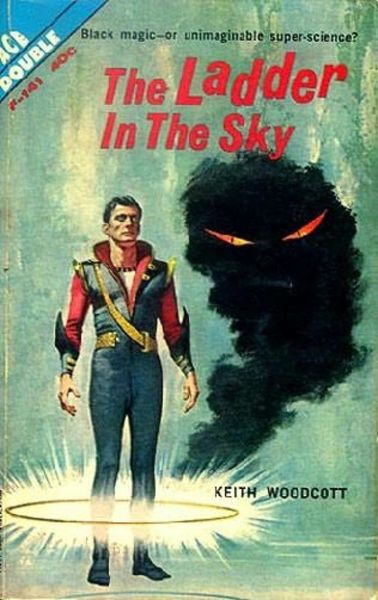Where My Demons Hide
The Ladder in the Sky
By John Brunner

25 Apr, 2023
John Brunner’s 1962 The Ladder in the Sky is a stand-alone science fiction novel. It was published under a penname, Keith Woodcott.
Kazan has lived all his eighteen years in Berak’s notorious Dyasthala, a slum from which escape seems impossible. Now escape of a sort presents itself, as a human sacrifice to forces from beyond the stars.
Lady Bryda the Conjurer wants to free her lover Prince Luth from the prison into which the interfering galactics consigned Luth. Galactic technology being far superior to that available on backward Berak, Bryda sees no alternative but to appeal to an entity whose nature even she can only guess at. This entity can and will help, for a price. Nobody said the sorcerer has to pay the price. Which is where Kazan comes in.
Kazan gains the abilities needed to free Luth. In exchange for this, Kazan must serve the entity for a year and a day. Exactly what this service will consist of, Kazan does not know. In any case, the question seems likely to be entirely academic for, once Luth has been freed, the prudent Lady Bryda orders Kazan weighted with chains and thrown into the nearest lake.
Kazan survives. Prince Luth is less fortunate; he is poisoned by a treacherous underling during his attempt to regain control of the planet. Backward Berak is now entirely under Galactic control. When the galactics begin recruiting for the mines on Vashti, Kazan is among the volunteers (much to the alarm of one of Luth’s surviving henchmen, who knows Kazan should be dead).
Kazan’s new bosses determine that Kazan’s primary flaw is that he is uneducated (thanks to the paucity of schooling in the slums). Otherwise, he shows great potential. With the aid of former prostitute Clary, who teaches him to read, Kazan begins the process of educating himself.
It’s all a heartwarming tale of a man, given the opportunity to better himself, taking advantage of it. However, Kazan is haunted by memories of the bargain. Is he possessed? Is he still Kazan or just a puppet who thinks he is Kazan? And what waits for him at the end of a year and a day?
~oOo~
The Ladder in the Sky was originally published as half of an Ace Double, presented tête-bêche with a second title, Robert Moore Williams’ The Darkness Before Tomorrow, which I have not read [1].
The Galactic community is neither notably exploitive nor notably generous. But they’re certainly better at governance than Prince Luth and his fellow aristocrats. The new policy of recruiting slum-dwellers to work in the mines until proper automation is introduced looks downright benevolent, compared to previous treatment of forced labor. The mines are brought up to speed earlier than they would have been, and the wretched masses have a chance to gain more marketable job skills. Everyone wins! Except Prince Luth.
While Lady Bryda and Kazan are convinced that Kazan has been enslaved by a demon, the reader will be aware that this isn’t a sword and sorcery novel and the “demon” is almost certain to be something else entirely. What that might be and why it is interested in humans is (of course) the big reveal. I will say that it is nowhere as malevolent as the barbarians assume. No doubt they were misled by the fact that on Berak, the powerful are always nasty people.
This novel came out three years and at least nine books after The World Swappers (see previous review). It’s an improvement, but not by much. Ladder in the Sky has flat characters and fairly linear plot. It is not a great book, which may explain why it was out of print for many decades, despite Brunner’s habit of reworking older novels to shore up his prodigious publication rate [2].
The Ladder in the Sky is available here (Amazon US), here (Amazon UK), here (Barnes & Noble), and here (Chapters-Indigo). I did not find Ladder at poor, doomed Book Depository.
1: Williams The Day They H‑Bombed Los Angeles looks familiar. I think it’s about the day someone H‑Bombed Los Angeles. I further think I know where my copy is.
2: Some of Brunner’s contemporaries, well-known SF authors such as Poul Anderson, Robert Silverberg, and Isaac Asimov, were also quite prolific. It was one way to make a reasonable living. Though I should perhaps note that Asimov didn’t write much SF in the decade that he focused on non-fiction. He was still extremely prolific, just not in SF.
